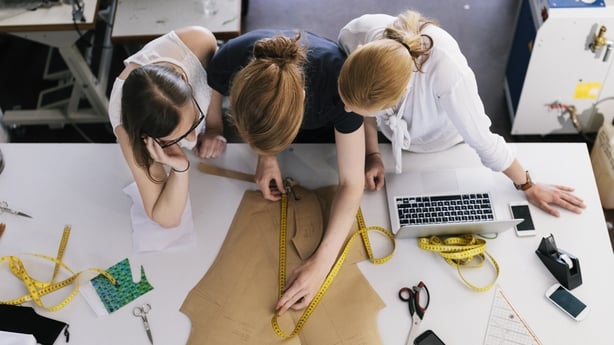When first dipping your toes into the realm of sustainable fashion, you'll likely be met by hundreds of cryptic buzzwords like 'made from recycled materials’, ‘environmentally friendly’ and ‘biodegradable’.
While these can sometimes be great indicators of a garment’s quality and/or story, there is little to no legislation regulating this vague messaging, meaning the truth behind any words printed on that garment tag swinging from your new t-shirt is pretty much anyone’s guess.
Basically, it’s an eco-lingo minefield - and that can be overwhelming.
But what if the easiest way to introduce yourself to sustainable fashion, make a positive impact on the planet and change-up your style, was already in your wardrobe?
The Zip Yard - an Irish tailoring franchise that now boasts 51 stores across the UK and Ireland - maintains that this is the case.
When I came across Irish stylist and fashion editor Zeda’s (@notzeda) outfit for the Platinum VIP Style Awards - a striking, one-shoulder, floor-length dress with beautiful panelling and elbow-length gloves to match - I immediately checked to see who was tagged in the post (i.e. responsible for this masterpiece). As it turns out, The Zip Yard’s Izabela Shann had partnered up with Zeda to create this vision of a gown.
A few weeks later, entrepreneur and sustainability strategist Pat Kane popped up on my feed boasting yet another wonderful creation from the business; this time, an old Burberry rain coat that had been re-gifted and just didn’t fit right. This was transformed into a sleek, timeless and weatherproof piece of outerwear with just a few expert nips-and-tucks.
Excited by these projects, I reached out to Caroline Wallace, Managing Director of the company's franchises in Ireland, to pick her brains on the subject of sustainable fashion.
"It’s looking at your own wardrobe with a new set of eyes. Rather than always going out and buying new clothes, we really urge you to go and pull out those pre-loved pieces, or those tired pieces that are a little bit outdated, and try to update them. If you can’t 'shop' in your own wardrobe, a great place to 'shop' is your sister’s, your mom’s or your friend’s."

Speaking on the influencer initiative, Wallace claims that there was no mastermind behind the idea, contrary to my assumption.
"It's taken its own organic roots. Obviously, there’s been a huge rise in influencers across Instagram, Facebook and TikTok. It’s a whole new industry of professionals that are working across social media, and they're looking for novel ways to show off the types of clothing that they wear. So, alterations have become very prominent in terms of that - it's not like we had a major strategy, we’ve just been reactive."
Furthermore, Wallace explains that the companies ethos may be responsible for their recent spike in recognition among and interaction with younger generations.
"Our ethos is to get as much longevity out of the clothes that you have, never to change the person wearing them. Our tagline is ‘We love everybody and every body’; it’s never about changing your weight or your appearance, it’s about changing the clothes so that they can give you confidence. I think people resonate with us for that reason."
Curious as to how the busines ensures a uniform standard of quality across their stores, I asked Wallace how the franchise assesses and educates their tailors.
"Oh, they all go through rigorous testing. First of all, people will tell you that they can sew to a certain degree - but the very first thing you have to check and see is whether they have used industrial sewing machines; lots of people can use domestic machines, but they'd sit down at an industrial machine and take the hand off them in seconds if they didn't know what they were doing.
"We also have training programmes for those seamstresses or tailors who wouldn't be of the exact calibre that we're looking at, but who do have potential; it’s kind of like a buddy system with one of our more experienced tailors."
On the topic of Ireland adopting more sustainable measures and regulations at a government-enforced level, Wallace states: "I don't think we have a choice. I mean, we have temperatures in our oceans that are five degrees higher than they should be. That is a huge problem.
"My sister can't leave her apartment because it's so hot and I’m sitting here with flooding and rain. I think that a circular economy and looking harder at sustainability is non-negotiable - it’s not enough just to talk anymore, we have to attack the industries that are causing the problem."

Inspired by the recently introduced French scheme that sees the government subsidise clothing and shoe repairs, in order to reduce waste and fight against pollution from the textile industry, Wallace says: "To see something like that initiative taking off here in Ireland would make a huge difference.
"We also have a crisis here in terms of income - it’s the world's first cost-of-living crisis - so regardless of how good alterations are, some people just can’t afford them. I think it's obvious that a subsidy like that would be incredible. I really do."
Finishing up the interview, the Managing Director spoke on the meaning and importance behind the advocacy of those like Kane, Zeda, broadcaster Fionnuala Moran and even Vogue Williams. "It is so incredible to have these amazing women with such huge followings shout about our business - not only for our company, but for the greater effect their influence will have on our planet."
Wallace joked that "It’s not just lip-service". "Vogue doesn’t touch down Dublin without visiting our South Anne Street shop - the woman lives in Chelsea, London, and she's coming to us to get her alterations done. I like to take that as a sign that we must be doing something right."


